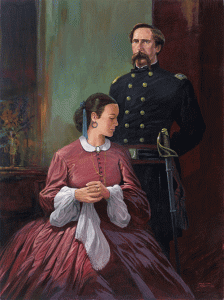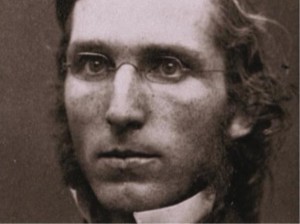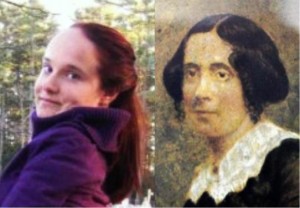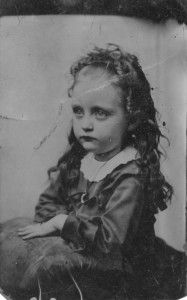 Today is the 157th wedding anniversary of Fanny Adams and Joshua Lawrence Chamberlain.
Today is the 157th wedding anniversary of Fanny Adams and Joshua Lawrence Chamberlain.
It was an unusual courtship marked by an unconventional age difference with Fanny being nearly three years older, long separations, arguing, jealousy, disapproving parents, and even the temptation of another woman. A little known fact about Fanny and Lawrence is that they actually met as toddlers. She was about four and he was about two when her adoptive mother visited his mother at the Chamberlain family farm. Despite being older, she was the same size as him, or so their mothers remarked, and they played together for that one day. Once Fanny’s mother bade Lawrence’s mother goodbye that day, they wouldn’t see each other again until they were in their early 20s.
Fanny Adams was an unusual lady for her century in that she had already lived on her own as an artist and musician by the time she met Lawrence. She had rather dreamy, idealistic thoughts about the concept of love but never really showed an ability to give up her identity for marriage. Her older sisters made fun of her as a teenager for always having this or that crush on boys in school, yet she generally found them to be void of depth of emotion and intellect. When she met Lawrence around 1849-1850, she was at an age generally believed to be on the verge of spinsterhood. She was 24 and he was 21. In those days, a younger man pursuing an older woman, even with just a few years difference, was considered a little strange.
In contrast with Fanny’s boy hopping, Lawrence doesn’t appear to have had any serious relationships with ladies before he met her. He grew up with a speech impediment (stuttering) that made him rather shy until he learned to overcome it in college. I don’t think he ever had the confidence to approach girls before then, although he must have had his fair share of secret crushes before he left the farm for college. Fanny was given a rather liberal education for a female. She was well-read, a professionally trained artist and musician, and she went to a music college in New York City. On the other hand, Lawrence came from a very strict religious household and was not allowed to read secular literature until he left home. He was the distinctly naive one of the pair when they found each other, which was rather unusual for the time. Typically, the lady was the naive half of the relationship, or allowed her man to view her that way. Lawrence’s continued education leveled the playing field and they became, for the most part, equals.
 Early on, the things they fought about were based in jealous games. Lawrence knew from day one that Fanny was it for him but his openness in expressing his feelings often made her recoil and fearful because she was much more private about how she felt. Sometimes she would ignore him altogether, or sit too close to another man in social places, or respond coyly when pressed for affirmations of her feelings, and all of these things were interpreted by him as rejection or not being as committed. Beastly, jealous letters would go back and forth until forgiveness came. He proposed multiple times before she accepted. It wasn’t that she didn’t love him – trust me, she did – but 19th century marriage entailed a lady giving up her religious, political, mental, and legal identities to her husband. Fanny was 26 when they got engaged. At that age, most of her peers were long ago married and well into raising children, while she still enjoyed an unusual level of independence. She wasn’t so willing to give that up for a man, but on the other hand, she loved him rather intensely, and finally decided to accept his proposal. So their arguments shifted from jealous banter to defining their roles once they were married. Fanny wanted to contribute to their family by continuing to teach music, while Lawrence suddenly developed his alpha male bone and insisted that he be the sole breadwinner. They argued about sex as well. Fanny was terrified of childbirth and suggested that perhaps they have a sexless marriage, to which Lawrence bluntly told her that he knew she couldn’t sleep with him and not want to be with him any more than he could with her. Women in those days were not supposed to enjoy sex but he was decidedly different from his peers in respecting a woman’s individuality and sexuality.
Early on, the things they fought about were based in jealous games. Lawrence knew from day one that Fanny was it for him but his openness in expressing his feelings often made her recoil and fearful because she was much more private about how she felt. Sometimes she would ignore him altogether, or sit too close to another man in social places, or respond coyly when pressed for affirmations of her feelings, and all of these things were interpreted by him as rejection or not being as committed. Beastly, jealous letters would go back and forth until forgiveness came. He proposed multiple times before she accepted. It wasn’t that she didn’t love him – trust me, she did – but 19th century marriage entailed a lady giving up her religious, political, mental, and legal identities to her husband. Fanny was 26 when they got engaged. At that age, most of her peers were long ago married and well into raising children, while she still enjoyed an unusual level of independence. She wasn’t so willing to give that up for a man, but on the other hand, she loved him rather intensely, and finally decided to accept his proposal. So their arguments shifted from jealous banter to defining their roles once they were married. Fanny wanted to contribute to their family by continuing to teach music, while Lawrence suddenly developed his alpha male bone and insisted that he be the sole breadwinner. They argued about sex as well. Fanny was terrified of childbirth and suggested that perhaps they have a sexless marriage, to which Lawrence bluntly told her that he knew she couldn’t sleep with him and not want to be with him any more than he could with her. Women in those days were not supposed to enjoy sex but he was decidedly different from his peers in respecting a woman’s individuality and sexuality.
The majority of their engagement from 1852 through 1855 was spent 1,000 miles apart with Fanny teaching music in Milledgeville, Georgia, and Lawrence attending the Bangor Theological Seminary in Maine. She had decided that she couldn’t bring debt into a marriage (legally, all of her possessions, money, and debt would belong to Lawrence), so she accepted a job in Georgia that paid better than jobs she could find in New England. She lived with distant relatives by the name of Orme house, which still stands virtually unchanged in Milledgeville today. The separation took a toll on their relationship despite their best efforts to focus on planning their future, playful banter bordering on obscene at times, and beautiful expressions of admiration and devotion. Evidence has come to light suggesting that Lawrence either came very close to having an affair or actually had an affair with his cousin, Annie, to console himself while being without Fanny.
When Fanny finally returned to Maine in the summer of 1855, she was turning 30 and feeling the pressure to marry in a hurry. Her adopted younger sister married in November, which Fanny found humiliating, because she had been engaged much longer and people left and right were asking her when Lawrence was going to get on with their marriage. He couldn’t be married without a job to support her and possible children, so it caused a delay.
 December came and finally a wedding date was settled. The wedding took place on the 7th at First Parish Congregationalist Church in Brunswick, Maine, and the service was conducted by her father, Reverend Adams. Against so many impossible odds and years of being apart, they made it to the altar, and they spent the winter honeymooning in Brewer, Maine, on the Chamberlain family farm. All of the talk about having a platonic marriage and illegal birth control appears to have been utterly pointless because Fanny got herself a honeymoon baby within four weeks of being married. So began a regular succession of babies born in 1856, 1857, 1858, 1860, and 1865. They were, in order – Grace (Daisy) Dupee, unnamed baby boy (premature, died same day), Harold Wyllys, Emily Stelle, and Gertrude Loraine/Lorraine depending on the source. Emily and Gertrude both died before they reached their first birthdays in two separate scarlet fever epidemics. It has been suggested by some that the depression that came with losing two children in the four years before the Civil War played a role in Lawrence’s decision to join the army, as if part of him wanted to get lost in something larger than himself.
December came and finally a wedding date was settled. The wedding took place on the 7th at First Parish Congregationalist Church in Brunswick, Maine, and the service was conducted by her father, Reverend Adams. Against so many impossible odds and years of being apart, they made it to the altar, and they spent the winter honeymooning in Brewer, Maine, on the Chamberlain family farm. All of the talk about having a platonic marriage and illegal birth control appears to have been utterly pointless because Fanny got herself a honeymoon baby within four weeks of being married. So began a regular succession of babies born in 1856, 1857, 1858, 1860, and 1865. They were, in order – Grace (Daisy) Dupee, unnamed baby boy (premature, died same day), Harold Wyllys, Emily Stelle, and Gertrude Loraine/Lorraine depending on the source. Emily and Gertrude both died before they reached their first birthdays in two separate scarlet fever epidemics. It has been suggested by some that the depression that came with losing two children in the four years before the Civil War played a role in Lawrence’s decision to join the army, as if part of him wanted to get lost in something larger than himself.
I usually get asked if I remember things from the prewar years, as they were during Fanny’s prime before she began to age and decline in health. It’s a rather complicated thing to try and explain. I spent a few years writing a book trying to explain it and I was never satisfied that I could articulate it well enough. As with all children who go through spontaneous past life memories, they are at their most vivid between ages two and nine, which was true for me, along with another period of vividness between about 18 and 25. Things are not so vivid anymore in visual terms because I’ve worked quite hard to undo the negative energy that carried over into this life from certain things in that one. When you work toward letting go of the bad, sometimes the good will fade too. And that’s okay. Past lives present themselves when there are incomplete life lessons or unresolved relationships, but when those old things are resolved, it will naturally fade into the background to allow you to concentrate on the here and now.
Most of what I still remember is what’s known as emotional memory. I feel the reactions, hopes, failures, loves, hates, etc., that I felt back then whether my conscious mind knows what I’m reacting to or not. For example, when I look at the people Fanny’s children have become today, my first instinct is to mother them even though they’re both older than me in this life. That’s emotional recognition. If I see Lawrence’s picture or even a representation of him in movies, my first emotional memory is long distance love. It was always that way before I even knew who he was (imagine how confusing that is to a young girl). The only places I truly feel at home in this country are Brunswick, Maine, and Portland, Maine, and those are places that haven’t undergone so many changes that Fanny wouldn’t recognize them when she lived there. I have always been intensely protective over the way Civil War vets are honored today, which can logically be seen as an extension of my former places as a colonel’s wife, then a general’s wife, and then First Lady of Maine during Reconstruction.
This is usually how it goes for adults who went through spontaneous past life memories as children. The visual memories will fade and become harder to recall but the emotional memories seem to be permanent. They’re easier to live with and don’t really intrude on present relationships. All of us carry around love for every spouse we’ve ever had (it’s just part of inter-soul bonding) but we still go on to create relationships with new people. The difference with people like me is I just happen to remember some of my previous marriages, both good and bad. I have compared it in the past to something a bit like widows/widowers going on to build new lives for themselves. They always carry the love they felt for the previous spouse but they still have room in their hearts for new love too. Admittedly, I find myself drawn to men who have intense personalities, mild egos, complicated minds and devotion to their purpose in life, much like Lawrence. It’s not conscious on my part until people point out, “Hey, he reminds me of your Chamberlain,” which has happened concerning more than one man. You could say I have a type. (Cue the snickering from every friend who has ever pointed it out to me.)
Most of my memories come from during the war. The reason for that, as I discussed in a previous blog about children’s past life memories, is because trauma seems to come back to people faster than pleasant memories. The war was incredibly traumatic on Lawrence and it was just as traumatic for me to patch him back together when he got sick or shot. He was shot six times. He had malaria, sunstroke, and various other illnesses in the war as well. Believe me when I say the wives were just as much warriors as their husbands. Ask any military wife today what they go through, especially with a wounded husband or a husband with PTSD (both Lawrence and his brother, Tom, suffered through PTSD). I acquired enough trauma in that war that it left scars on my soul, which were still there when I was reborn as Jessica, and brought me nightmares as a toddler of blood, gore, and army hospitals.
The glimpses of things I still have that were from before the war concerned the “jealous period”. There is a brief glimpse of some kind of party ending and everyone crowding the hall to get hats, coats, and bonnets, along with goodbyes and such. Someone was helping me with my coat or whatever it was, and Lawrence caught my eye around some people but I felt indignant and wouldn’t speak to him. I turned my back to him and made a fuss laughing with other people, pretending to have a good time. Why? I don’t know. I don’t have a backstory other than the feeling that I was trying to hurt him for some reason. People in new relationships do stupid things like that no matter what century it is.
The one story I’ve never forgotten is one that I’ve told before but I think it’s important for people to be reminded of the simplicity when everything falls into place. I couldn’t tell you what year it was but I suspect it was 1851-ish. We were walking along the river – I’m guessing it was the Androscoggin River – and it was vivid enough that I could feel the weight of my dress and the uneven ground beneath my feet. For someone who doesn’t walk, that’s a completely foreign sensation. The grass was tall and a breeze pulled it toward the river. A treeline stood to the right and got closer to the riverbank up ahead. I was leading the way to a place I knew and I could hear his heavier footsteps behind me. I looked over my left shoulder and there he was, walking along behind me, carrying a wooden chest under one arm and an easel under the other. The way he looked at me with a silent smile as we walked made something click in my head for the first time and I thought, “He loves me.” I don’t know when it was or what happened before or after that, or why I even remembered it at all, but it hasn’t faded in all these years. It never changes. Not one leaf on a tree changes. It’s as present in my mind as it was when it happened.
Several years ago, I looked for a picture of a place that looked like what I remembered and this was as close as I could get. This is the Androscoggin River near Brunswick, Maine.
When I die, this is the place I intend to go to meet him again.
Read More


















